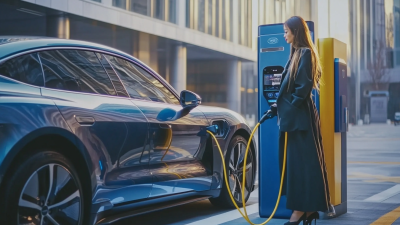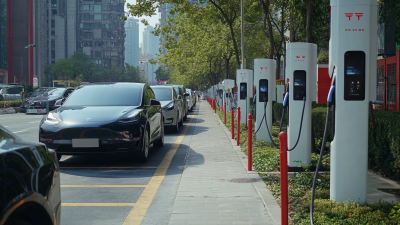Leave Your Message
In recent years, the global automotive landscape has undergone a significant transformation, driven by the urgent need for sustainable alternatives in response to climate change and rising fuel prices. As a result, Automobile Electric solutions have emerged as a pivotal force in reshaping the future of transportation. With advancements in battery technology, charging infrastructure, and government incentives, electric vehicles (EVs) are no longer just an environmentally friendly option; they are becoming increasingly attractive for consumers worldwide.

This blog explores the myriad advantages of adopting Automobile Electric alternatives, from cost savings and lower emissions to enhanced performance and innovative features. By delving into these benefits, we aim to provide global buyers with a comprehensive understanding of why making the switch to electric vehicles is not only a wise choice for personal and economic reasons but also a crucial step towards a sustainable future.
The rise of electric vehicles (EVs) marks a significant shift towards environmental sustainability in the automotive industry. With traditional gasoline-powered cars contributing to greenhouse gas emissions,
EVs present a cleaner alternative by utilizing renewable energy sources. This transition not only reduces the carbon footprint of transportation but also diminishes urban air pollution. As global awareness of climate change increases,
consumers are becoming more inclined to choose electric solutions that align with their values of eco-friendliness and sustainability.
Furthermore, the adoption of electric vehicles fosters innovation in energy technology and infrastructure. As more EVs hit the roads, the demand for renewable energy sources—such as solar and wind—grows, leading to advancements in energy storage and grid management. This synergy between electric vehicles and renewable energy is crucial for achieving a sustainable future, allowing global buyers to play an active role in combating climate change. By embracing electric mobility, consumers are not just opting for a vehicle but are investing in a transformative movement towards a cleaner, more sustainable planet.
Electric vehicles (EVs) have gained traction globally, primarily due to their potential for substantial long-term cost savings. While the initial purchase price of an electric car may seem steep, the savings in fuel and maintenance costs can outweigh this investment over time. With the rising fuel prices for gasoline cars, EV owners benefit from significantly lower costs per mile, contributing to a more economical ownership experience. Additionally, government incentives in various countries further enhance the financial appeal of electric vehicles, making them an increasingly viable option for budget-conscious consumers.

However, prospective buyers should remain aware of the hidden costs associated with owning an electric vehicle. Issues such as range anxiety owing to limited charging infrastructure and the high costs of battery replacement can create concerns for new owners. Moreover, although the running costs of EVs tend to be lower, the depreciation rate of electric cars can be faster in certain markets, impacting their resale value. In weighing the decision to purchase an electric vehicle, it's crucial to consider both the long-term financial benefits and the potential challenges that accompany this transition to greener technology.
The electric vehicle (EV) market is propelled forward by rapid technological advancements that are reshaping how consumers perceive sustainable transportation. According to the International Energy Agency (IEA), global electric car stock reached over 10 million in 2020, marking a 43% increase from the previous year. This surge is largely attributed to innovations in battery technology, particularly the improvement of energy density and reductions in production costs, which have made electric vehicles more affordable and attractive to a broader audience.
Furthermore, advancements in charging infrastructure are essential for the EV ecosystem. A report by Bloomberg New Energy Finance projected that by 2040, there would be around 550 million electric vehicles on the road, supported by an extensive network of fast-charging stations. Companies are investing heavily in developing ultra-fast chargers, capable of delivering up to 300 kW, significantly reducing waiting times for drivers. This technological progress is critical in building consumer confidence and addressing range anxiety, both of which are pivotal for the mainstream adoption of electric vehicles across various global markets.
The global shift towards electric vehicles (EVs) is significantly bolstered by government incentives and policies. According to the International Energy Agency (IEA), EV sales surged by 40% in 2020 compared to the previous year, highlighting the crucial role of governmental support in adoption rates. Various countries are implementing tax credits, rebates, and grants to lower the upfront costs for consumers. For instance, in the United States, a federal tax credit of up to $7,500 is available for the purchase of new electric cars, making the transition to EVs more financially viable for many buyers.
Additionally, many governments are setting ambitious targets for phasing out internal combustion engines. The United Kingdom, for example, aims to ban the sale of new petrol and diesel vehicles by 2030, a move that aligns with their broader net-zero emissions goals by 2050. In response to these policies, automakers are ramping up production of electric models, with the global market for electric vehicles projected to reach over 26 million units by 2030, according to BloombergNEF. This momentum not only supports sustainable transport solutions but also fosters innovation and economic growth within the automotive sector.
The future of mobility is increasingly shaped by trends that highlight the advantages of electric vehicle (EV) solutions. As we delve into the expected growth of the electric vehicle market, notable projections reveal a robust trajectory. For instance, the Indian electric vehicle market is anticipated to expand from $23.38 billion in 2024 to an impressive $117.78 billion by 2032, achieving a compound annual growth rate (CAGR) of 22.4%. This surge indicates not just a demand for eco-friendly transportation, but also an evolving infrastructure that supports electric mobility.

Moreover, the market for mobile energy storage systems is set to experience significant growth, projected to rise from $58.28 billion in 2025 to $156.16 billion by 2032, with a CAGR of 15.12%. This reflects a broader trend toward energy efficiency and sustainability in automobile manufacturing. As technological advancements decrease costs and improve efficiencies, the integration of energy storage solutions within electric vehicles becomes increasingly feasible, paving the way for enhanced performance and consumer acceptance. The convergence of these trends is fueling a transformative shift in the automotive landscape, positioning electric solutions at the forefront of mobility innovation.






